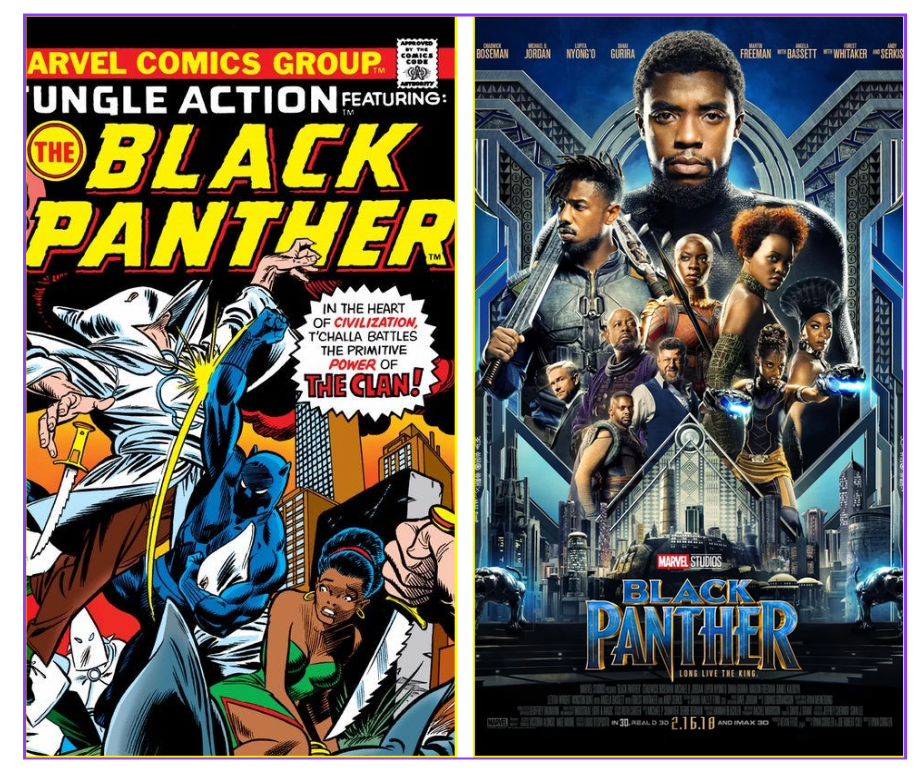When Chadwick Boseman played T’Challa in Marvel’s “Black Panther,” a lot of people thought it was a special and important moment. For the first time in big superhero movies, a Black hero was the main character, and he was shown as strong, smart, and full of feelings. His home, Wakanda, was a symbol of African pride, strength, and future possibilities. In this way, Black Panther moved from being a side character in comics to a global movie star. This shift tells us a lot about how media—movies, TV, and comics—are changing and how these changes affect society.
For many years, there weren’t many Black superheroes in movies or comics. When they did appear, they often played small parts or had stereotypes that weren’t fair. For example, early stories about Black Panther, like “The Panther vs The Klan,” were very important but not seen by most people. Black Panther was often a guest character, not the main hero, and stories rarely showed how complex Black identity and culture are. Instead, they focused on stereotypes or were meant to appeal mostly to white audiences.
The way Black Panther was shown changed when Marvel started making movies. In the 2018 film “Black Panther,” directed by Ryan Coogler, audiences saw a different version. T’Challa was not just a symbol of trouble or pain; he was a proud king, a smart scientist, and a loving family man. The film was a big success and became a symbol of cultural pride. Black Panther was not just a token hero; he was a leader that everyone respected. Along with his sister Shuri, a genius scientist, and Okoye, a brave warrior, T’Challa was part of a team that showed strength and kindness.
What makes Black Panther special is how deep and real his character is. T’Challa is both a hero who saves people and a young king trying to learn how to lead. He makes mistakes, feels sad sometimes, and struggles with his responsibilities. His story is very personal; it’s about grief, duty, and hope. Wakanda, his homeland, is no longer just a fictional place. It is a character in the story, with its own history and challenges. This helps make the story more human and less like a stereotype. It shows that Black people can be heroes, leaders, and real people at the same time.
The impact of this change reached far beyond the movies. Many children, especially Black children, saw themselves in T’Challa for the first time. They felt proud and inspired when they saw a hero who looked like them. Parents and teachers noticed that kids’ confidence grew when they felt represented in the stories they loved. Children dressed up as Black Panther for Halloween, played Wakanda games, and learned some words from the fictional Wakandan language. This helped many feel more connected to their culture and proud of who they are.
The success of Black Panther also sparked a bigger conversation about race and diversity in movies and TV. More studios started giving chances to actors, writers, and directors from different backgrounds. People wanted movies and shows that told real stories of diverse communities. However, not everyone was happy. Some critics accused Hollywood of only using diversity to make money or called it “tokenism.” Others worried that these stories didn’t always truly reflect the real experiences of Black people, focusing only on surface issues without deeper truth.
Despite these disagreements, research shows that seeing characters like Black Panther helps people feel more confident about themselves. When underrepresented groups see heroes, leaders, and scientists who look like them, they believe that they can achieve similar greatness. It also teaches everyone that qualities like bravery, intelligence, and kindness are not connected to race or background. Instead, they are qualities we all share.
In the end, Black Panther’s journey from being a small comic book character to a movie hero shows how society is changing. He is not just a superhero but a symbol of hope, pride, and real human potential. His story has inspired millions and opened new doors for more diverse stories in media. It teaches us that everyone deserves to be seen, respected, and celebrated for who they truly are.


Provide Feedback